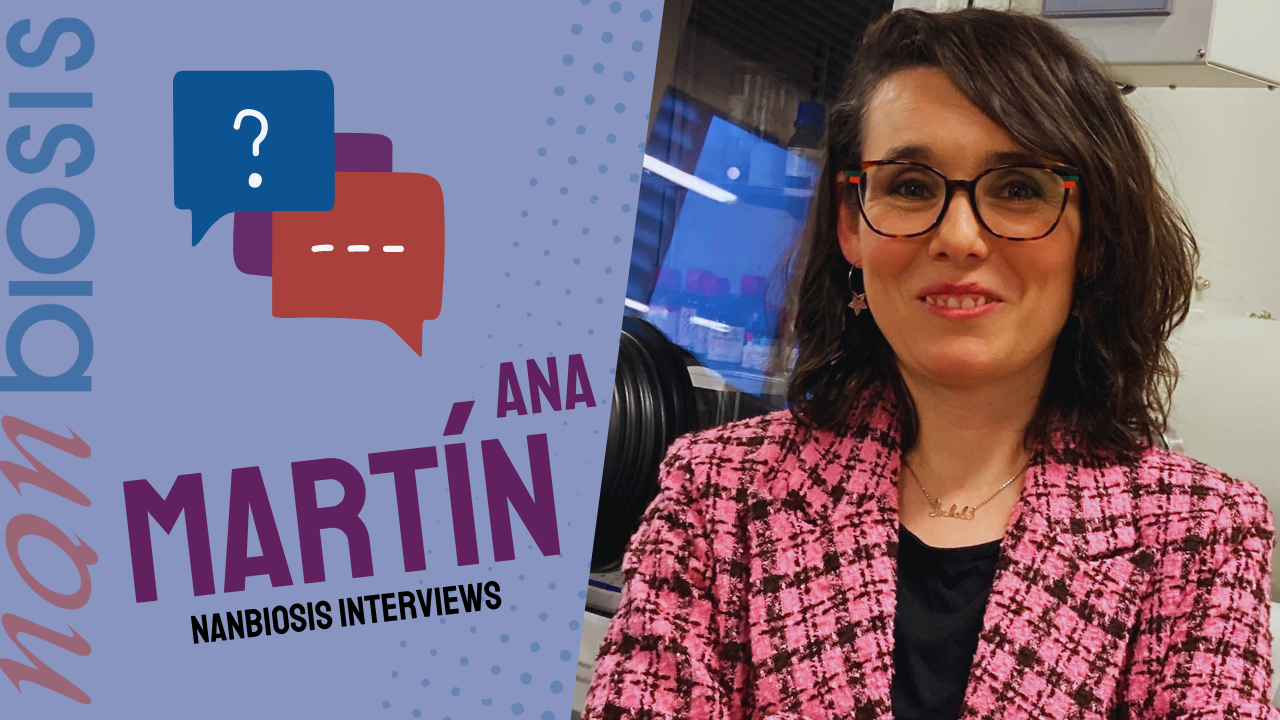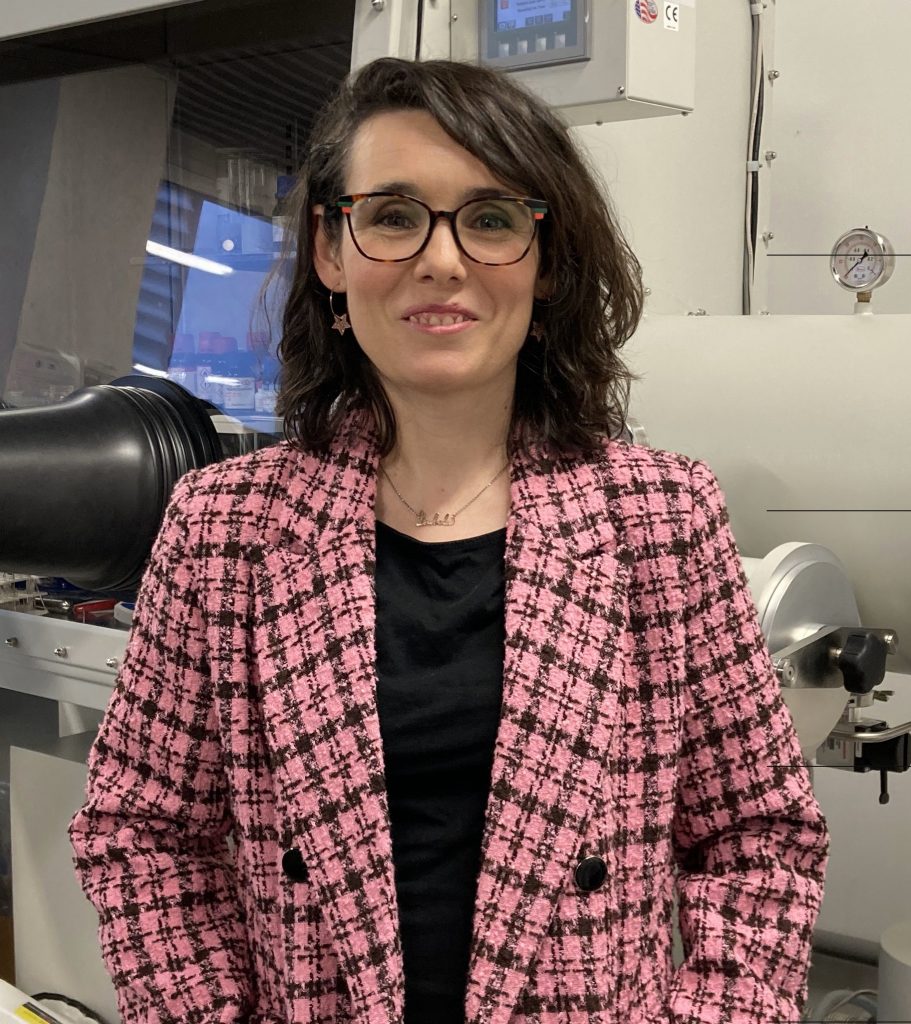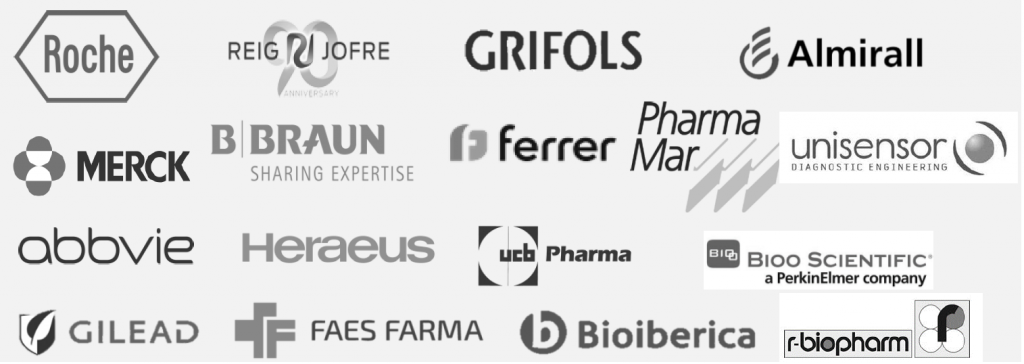
We ask Dr. Martín about her innovations in cancer treatment with nanoparticles, in the context of her collaborations with NANBIOSIS.
This is part of a series of interviews to several female researchers within the context of International Day of Women and Girls in Science 2024 and Woman’s Day 2024. For more interviews, visit our news section here.
February 2024, INMA-CSIC/CIBER-BBN, Zaragoza (Spain)
We are walking through the tall corridors that connect the numerous blocks of the large R&D Building, located near the Río Ebro Campus of Unizar. This building is a conglomerate of institutes, laboratories, and research groups. In its dead center, open to the outdoors, a Zen Garden welcomes us, like an oasis of peace in the midst of this whirlwind of information, advancements, and scientific progress.
We enter the meeting room. The lights are flooding a large dark table surrounded by chairs. After a few minutes, Ana arrives. We greet each other warmly. It has been a long time since we last saw each other, perhaps since college? With a nervous laugh, she confesses, “Having a microphone in front of you is quite intimidating…”. She laughs again.
I consider making a joke right after the first question, in an attempt to reassure her. But I quickly change my mind as soon as she starts talking. Her nerves have completely dissipated, and her words, once shaky, now fill the recording with a confidence I didn’t expect. The confidence of someone who carries behind them a career as varied as it is fascinating.
The interview begins.
Well, Ana, tell us a little about yourself.
“My name is Ana. I have a degree in Veterinary Medicine, a degree in Biochemistry, and a Ph.D. from the University of Zaragoza. Currently, I work in the NFP group. My chemist colleagues synthesize nanoparticles, and I use them for anti-cancer treatments.”
What motivated you to choose a career in science?
“Since I was little, I’ve always been very interested in natural sciences. I’ve always been intrigued by how biological systems work, and over time, I became interested in pathology, the cause of diseases, and their treatment. That’s why when I had to choose a career, I chose Veterinary Medicine and, later, Biochemistry.”
Could you share with us a bit about your research area and the projects you are currently working on?
“Since I started working in research, I have been involved in the field of biomedicine, but the areas have been progressively changing. My career began in the field of aging and vascular diseases. Later on, I applied this knowledge to cancer research, which is the field I am currently working in, using nanoparticles as an anti-tumor treatment.”
What nanoparticles do you use?
“We use nanoparticles that, through catalysis, consume glucose and produce toxic species, inducing cell death specifically in tumor cells. We have many types of nanoparticles, especially by combining different types of metals. We introduce them into extracellular vesicles, which have tropism towards tumors, significantly improving the treatment compared to free nanoparticles.”
And what types of cancer do you treat?
“We use different cell lines from lung cancer, colon cancer, cervical cancer, brain cancer… We aim to create a treatment that is not specific to one type of cancer but can be applicable to many types of tumors. And high glucose consumption is something that tumors have in common.”
What have been the greatest challenges you have faced as a woman in the field of research?
“I believe the most difficult challenge has been balancing a scientific career with personal life, specifically with motherhood. When you work as a scientific researcher, there is never a perfect time to have children. You know that your career will be put on hold for a while, and research never stops, so there is a constant fear of falling behind. But as a scientist and a mother, I think one should never give up on motherhood because of it. In the end, everything is achievable, and personal life should never be sacrificed for professional life.”
Have you experienced any gender bias or added difficulty in your scientific career? How have you addressed this situation?
“In my case, I have been fortunate and I don’t believe I have experienced any gender bias. However, I do know of cases involving female colleagues who have encountered it.”

“There are challenging moments during a scientific career (…), but in the end, persistence pays off.“
—Dr. Ana Martín, collaborator scientist in Unit 9.
What advice would you give to young women considering pursuing a career in science?
“My advice would be to enjoy the work in research. We have to remember that it is one of the best jobs out there; we are doing something for society, to improve it, whether working in biomedicine or other areas like technology. There are challenging moments during a scientific career, times when it’s difficult (due to lack of funding, opportunities, etc.), but in the end, persistence pays off. And if for some reason it doesn’t work out, all the knowledge gained will still be very useful in other areas.”
And what advice would you give to those who are unsure?
“Well, if they’re not sure… before diving into a doctoral thesis, they should visit laboratories, see how things work here, and choose something they enjoy. Because you’re going to spend a lot of time working on it, and the environment you’re in is very important.”
How do you think gender stereotypes can be overcome in your research field?
“I don’t believe there are gender stereotypes. However, it is true that currently, positions of greater responsibility are often held by men. In my opinion, equal opportunities should be given to men and women, and the time taken by women for their careers due to motherhood should not be penalized. This way, we can finally break the ‘glass ceiling’, and young people can also have female role models.”
And what about being a mother?
“In other countries, I’ve seen people having children during their doctoral thesis, and that’s unthinkable here. I believe the measures taken so far are just a patch and don’t fully compensate.”
What do you consider your greatest achievement or contribution in your field of study?
“Personally, my greatest achievement was obtaining a project on breast cancer in which I was Principal Investigator. As for my greatest contribution, I couldn’t say for sure. I believe everything I have done has contributed a little bit to research on vascular calcification, aging, and cancer. Perhaps it may seem somewhat insignificant, but it could be very important in aiding future research.”
What support have you received throughout your career that has been particularly helpful?
“The support of my family and my partner has been indispensable throughout my career. I also appreciate the support of the Government of Aragon and the European Union for the funding I received during my predoctoral and postdoctoral stages.”
What changes would you like to see in the scientific world to promote gender equality?
“I would like to see women not have to postpone or give up their personal lives for their work. I believe that, with the support of institutions, anything is achievable, as is the case in other European countries.”
How do you think we can encourage more women and girls to participate in science?
“I truly believe that there are more women in science than men. The problem is that leadership positions are almost never held by women, perhaps because many women end up sacrificing their careers for their personal lives, and that shouldn’t happen. We should break the glass ceiling and allow women to access leadership positions so that girls have examples of female scientists to follow and don’t think that science is only for men.”
It’s been a pleasure to see you again and chat with you, Ana. And thank you for your time.
“Thanks to you too.”
For more interviews like this, visit our news section here.
Additional information:
The goal of NANBIOSIS is to provide comprehensive and integrated advanced solutions for companies and research institutions in biomedical applications. All of this is done through a single-entry point, involving the design and production of biomaterials, nanomaterials, and their nanoconjugates. This includes their characterization from physical-chemical, functional, toxicological, and biological perspectives (preclinical validation).
In order to access our biomedical Solutions, apply here.
NANBIOSIS has worked with pharmaceutical companies of all sizes in the areas of drug delivery, biomaterials and regenerative medicine. Here are a few of them:









